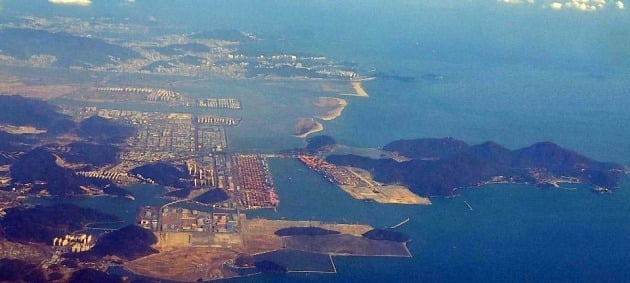
Gadeokdo Island in Busan (right of the photo) and the entire area of the Busan Port New Port. /Photo = Yonhap News
Since the passage of the Special Act of Gadeokdo New Airport, the debate over the economic feasibility of the airport is growing. In particular, the city’s annual demand for the airport is estimated to be 46 million passengers and 990,000 tons of cargo in the long term.
Busan City predicted that Busan’s international and domestic air passenger demand in 2056 would be 46.4 million and 10.42 million, respectively, based on the growth projections for Asia presented by the National Civil Aviation Organization (ICAO). Considering the fact that it has been argued that it is already saturated, it is the logic that most of the demand for this international flight will be carried by Gadukdo New Airport.
As predicted by Busan, the number of passengers at Gadeokdo New Airport is ranked 40th and 20th among airports in the world, reaching the level of major airports in the world. Comparing the number of passengers to major foreign airports, the number of passengers is comparable to Gatwick Airport, the second gateway to London, England, and Shenyang Airport in Xian, China. Compared to the number of passengers using Incheon International Airport, it is about 65%. Cargo handling volume is close to that of New York’s JFK Airport, which represents the United States, and Japan’s Haneda Airport.
For this reason, considering the trend of declining population in Korea, concerns are raised that Busan’s forecast is excessive. Some experts point out that “in terms of the population level, it is only possible to achieve a tolerable province in China.”
As expected in Busan…
Passengers ranked 40th in the world, cargo ranked 20th

Number of passengers by airport worldwide in 2019. The estimated annual passenger demand for international flights at Gadeokdo New Airport in Busan (46 million) is ranked in the 40th place in the world as of 2019. /Graph = Reporter Shin Hyun-bo, Hankyung.com

Cargo (tons) transport by airport worldwide in 2019. Busan City’s estimated annual cargo demand (990,000 tons) at Gadeokdo New Airport is in the mid-20th place in the world as of 2019. /Graph = Reporter Shin Hyun-bo, Hankyung.com
The city of Busan estimated the number of international passengers at Gadeokdo New Airport at 46 million annually in 2056, based on the explanation data of Gadeokdo New Airport. Hankyung.com NewsLab analyzed the airport traffic report around the world by the Airports Council International, which is 65% of Incheon Airport (71.2 million people) as of 2019. In addition, this is equivalent to the UK’s Gatwick (46.85 million), the US Newark Liberty (46.34 million), Sky Harbor (46.29 million), and Miami (4592 million), and is currently ranked in the top 40 in the world.
Busan City recently announced that if the annual average cargo growth rate suggested by the 5th Mid-to-Long-Term Comprehensive Plan for Airport Development by the Ministry of Land, Infrastructure and Transport is reflected, the demand for cargo at Gadeokdo New Airport will reach 990,000 tons in 2060. Also, according to data from the International Aviation Commission, it is in the mid-20th level in the world, more than Indianapolis International Airport (92 million tons), which is the 8th place in the United States by cargo in 2019.
Busan City said, “The demand for Gadukdo New Airport was calculated based on the growth rate forecast of an international organization with credibility and the growth rate suggested by the government’s mid- to long-term comprehensive airport development plan.”
However, the Ministry of Land, Infrastructure and Transport has always shown a position of “excessive”. An official from the Ministry of Land, Infrastructure and Transport explained that “Busan’s passenger and cargo demand is the result of applying the methodology on the premise that demand will increase every year, contrary to the preliminary feasibility study (preliminary feasibility study) guidelines.” Actually, Busan’s estimate is 2.4 times more passengers and up to 90 times more cargo than Gimhae New Airport’s Yeta. The Ministry of Land, Infrastructure and Transport said it plans to conduct a preliminary feasibility study in accordance with the passage of the Gadeokdo New Airport Special Act.
The number of 46 million has sparked controversy in academia and politics as well. Last year, former Minister of Justice Cho Kook criticized the new airport in 2012, but on the basis of his change of thoughts, “The demand for aviation in Boo, Ul and Gyeong is 46 million in 2056, which is economically feasible.”
Then, Professor Han-sang Lee of Korea University at the time said, “In 2056, the population of Boo, Ul, and Gyeong is predicted to be 6.5 million, and it means that all citizens fly seven times a year.” They will confirm that they are the ones who have built up the wall,” he criticized.
“The finances grow like a snowball…”
Opinion also’reverse’ 10% P↑ for one month
Concerns about finances are increasing rapidly as the business is gaining momentum due to unreasonable demand forecasts and passage of special laws. On the 15th, Lee Jun-koo, professor emeritus of the Department of Economics at Seoul National University, strongly criticized the government’s financial management method, saying through his personal website on the 15th that the ruling and opposition parties promoted the Special Act on Exemption for Exemption for political purposes rather than economic purposes. Professor Lee pointed out that “a more conservative attitude is needed in a situation where fiscal expenditures are snowballing like a snowball these days and concerns about the state debt are increasing.”
According to a poll in the second week of March at Gallup Korea, 47% oppose the construction of the new airport on Gadeokdo Island, 20 percentage points higher than that of 29%. An official from Gallup Korea said, “Nationally, opposition has increased from a month ago,” and said, “The pros and cons decreased by 4 percentage points and the opposition increased by 10 percentage points, and the difference increased.”
Shin Hyun-bo, Hankyung.com reporter [email protected]
